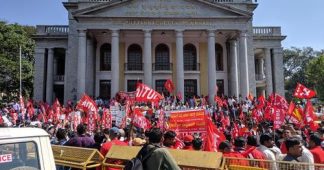November 01, 2019
The end of the Chicago teachers’ strike comes amid a wave of labor movements, including the longest United Auto Workers strike in almost 50 years. We speak with labor journalist Sarah Jaffe about the historical importance of unions, the rise of worker participation in strike actions and the significance of the Labour Party’s organizing in the United Kingdom. Jaffe says workers “are fighting back in the face of decades and decades of concessions, decades and decades of give-backs,” and “understanding that unionizing is a way that they have power on the job.” She is the author of Necessary Trouble: Americans in Revolt.
Transcript
AMY GOODMAN: Sarah Jaffe, there is a lot of union activism going on right now, not only teachers across the country, but you have—the GM strike ended on Friday. We’re talking about nearly 50,000 workers and the most significant strike against GM in like half a century. And you have on Wednesday, UAW reaching a deal with Ford. Talk about this.
SARAH JAFFE: Where to begin! It was surprising to almost everybody, including some of the workers at GM, that the union was willing to go to a strike in the first place. They were out on strike for I believe over four weeks, for 60 days—40 days, I’m sorry. And when you look at what’s going on in the country, again, I always start with Chicago, sort of reviving the strike. But at GM, you also saw the difference between what it looks like to have a union like the CTU that is prepared for this, that knows what they’re going for, that has a Democratic bargaining structure, a big bargaining team that is transparent and communicates with its members, versus a lot of the GM workers that I talked to were feeling kind of uncomfortable, not sure what was going on, didn’t feel the union leadership was communicating with them, and are disappointed in the contract. And the contract nearly didn’t pass. I talked to a lot of workers who were voting no on it.
So the question of whether you can take the kind of bargaining for a common good framework that the CTU and other teachers unions have been using and apply that to the private sector, apply that to places like GM, where, you know—the UAW did build the middle class in this country. The UAW’s bargaining has always also been for the common good. But it is a little harder to take those issues of homelessness in the community, for instance, to the bargaining table when you are workers at an auto company, an auto company that is facing major changes in its business model.
One of the fights at GM this time around was about the closure of certain plants. They were talking about opening a battery plant for electric car production in the area around where the Lordstown plant was in Lordstown, Ohio. But those are jobs that are not going to be covered by the same contract. They’re going to be outside. GM wants those to be lower wage, lower security jobs because that’s actually the future of where the company is going. So the GM strike was a mixed bag. Still, the big thing about it is that the workers were ready to stay out. And 43% of the GM workers were ready to continue the strike, to fight for more.
Read more at https://www.democracynow.org/2019/11/1/











